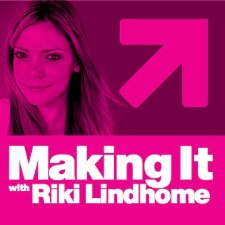 Riki Lindhome is a delightful actor, comedian, and musician. She has a podcast called Making It in which she interviews actors, directors, stand-up comedians, and casting directors about how their careers have unfolded and what lessons they have learned along the way.
Riki Lindhome is a delightful actor, comedian, and musician. She has a podcast called Making It in which she interviews actors, directors, stand-up comedians, and casting directors about how their careers have unfolded and what lessons they have learned along the way.
On more than one occasion on the podcast Riki has related a story from the beginning of her own career. Early on she realized that she was a long way from where she wanted to be and her dreams of being a full time actor seemed like a long shot. As she tells it, naturally her confidence wasn’t super high. Friends and family would offer what they thought, were helpful pieces of advice like “Oh that is going to be really hard”, “Make sure you get a good degree” and “Have you considered other careers?”
Riki would tell them, “I am not accepting those statements right now. If you don’t have something that is helpful or encouraging to say you are going to have to keep it to yourself.”
How awesome is that?!?
She had enough sense to see that the things her loved ones were going to say to her were only going to nurture the already planted seeds of doubt and make things even harder.
Our loved ones often say things to us that they believe are helpful, encouraging, or they think by warning us of possible danger they are keeping us safe. In reality they aren’t being helpful, and often make us feel worse than we already feel.
It is good that we have people in our lives who are worried for us and want the best for us. Just because they want the best for us doesn’t mean they know what is best for us or that they are being helpful. We can appreciate their concerns, without, in Riki’s words, “accepting those types of statement at this time.”
Here is a tapping script to help you get into a place where you can let loved ones know you appreciate their concern but that you need to make choices for yourself.
I know the people in my life want what is best for me…They want me to be safe…They want me to be happy…But they want in their terms…They see what is possible through their eyes…They see what is possible through their experience…They don’t know what is right for me…Because I have my own definition of that…This doesn’t mean I know exactly where I am going…This doesn’t mean that I am totally confident in the path I have chosen…But it is my path…That I have chosen for myself…I give myself permission to let the people in my life know that I appreciate that they want what is best for me…I give myself permission to tell the people in my life that at this time their feedback isn’t helpful…I give myself permission to tell the people in my life that I am not accepting any comments from them at this time that are not encouraging…It might be hard to tell my loved ones this…But it is the best thing for me…If they truly want what is best for me…They are going to accept follow my request…I know that from time to time I am going to need to remind them that I am not accepting that type of feedback…But it is the best thing for me…I wouldn’t eat junk food before I run a race…And I am not taking anything that isn’t supportive or healthy for my dreams…I need to choose what I am taking in to make sure I reach my goal.
I would love to hear how loved ones in your life have tried to be helpful but ended up being undermining to you. How did you combat their comments to keep moving in the right direction?
A powerful statement indeed: to not let your own attitude be burdened by the fears of parents and friends. Thank you, Gene, for posting this. Requesting those close to us to only make encouraging or helpful statements requires them to find new ways of expressing their love, which they might initially feel unable to, when they are set in their ways of thinking.
When we, as grown-ups, realize, that we are already running the habit of thinking this kind of less than helpful thoughts “on autopilot”, the following challenge remains:
How to rebuild our attitude and thinking habits in a positive, supportive way, so they actually fuel our goal-achieving behaviour.